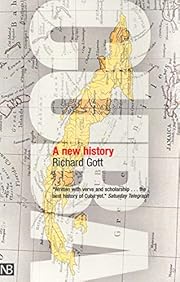

Fai clic su di un'immagine per andare a Google Ricerca Libri.
|
Sto caricando le informazioni... Cuba: A New Historydi Richard Gott
 Sto caricando le informazioni...
Iscriviti per consentire a LibraryThing di scoprire se ti piacerà questo libro. Attualmente non vi sono conversazioni su questo libro.  The trip I was reading this to prep for didn't happen, and the book itself is... probably a pretty good historical overview up to the 21st century, but I have always had a tough time reading historical overviews. Men leading armies and redrawing lines on maps and pushing money around bores me; I need an angle. I may still read [b:Bacardi and the Long Fight for Cuba: The Biography of a Cause|3216410|Bacardi and the Long Fight for Cuba The Biography of a Cause|Tom Gjelten|https://d2arxad8u2l0g7.cloudfront.net/books/1440013662s/3216410.jpg|3250343] -- that's a great angle. Richard Gott achieves two useful things in this survey history. One is that he consistently illustrates how the impact of bad racial relations delayed the creation of a coherent Cuban society, and thus of a viable Cuban state. Two, one is also reminded that, respect or loath him, Fidel Castro is the great man of Cuban history. The question is whether his achievement is that of an Ataturk (which stands up over time) or of a Tito (which collapses soon after the man's demise). Gott's suggestion is that those looking for dramatic change after Fidel passes on will be disappointed, as a younger generation of leaders has been groomed and is waiting in the wings, though they are of a technocratic rather than revolutionary flavor. However, my overall feelings about this book are only marginally positive. The Cold War portions often have a rehashed feeling and Gott's prose doesn't exactly sing. If you've been paying attention to current events for the last thirty or so years you'll wonder why you're even bothering. My biggest complaint is probably that Gott really didn't offer an answer to my main reason for reading this book; why the Batista regime fell, as opposed to Castro winning. Regardless of the leadership skills of the Castro Brothers and Che Guevara, and Batista having worn out his welcome, with even decent military ability on the part of the regime this is a fight that shouldn't have been lost. The suggestion would seem to be that the traditional Cuban leadership classes were not prepared to back a mestizo-dominated regime against a rebellion where the leadership was more socially reflective of the sort of people (emigre whites) that had been the bulwark of social order. Or did Batista's purge of the old officer elite degrade the Cuban military past recovery? The sheer dogged willingness of the Bolivian military to hunt down and eliminate Che is suggestive. Unfortunately, Gott doesn't have the analytic chops to follow this line of thought up, despite having set the table.
Elenchi di rilievo
This new look at the history of Cuba illuminates the island's entire revolutionary past as well as the most recent decades of the Castro regime Events in Fidel Castro's island nation often command international attention and just as often inspire controversy. Impassioned debate over situations as diverse as the Cuban Missile Crisis and the Elián Gonzáles affair is characteristic not only of modern times but of centuries of Cuban history. In this concise and up-to-date book, British journalist Richard Gott casts a fresh eye on the history of the Caribbean island from its pre-Columbian origins to the present day. He provides a European perspective on a country that is perhaps too frequently seen solely from the American point of view. The author emphasizes such little-known aspects of Cuba's history as its tradition of racism and violence, its black rebellions, the survival of its Indian peoples, and the lasting influence of Spain. The book also offers an original look at aspects of the Revolution, including Castro's relationship with the Soviet Union, military exploits in Africa, and his attempts to promote revolution in Latin America and among American blacks. In a concluding section, Gott tells the extraordinary story of the Revolution's survival in the post-Soviet years. Non sono state trovate descrizioni di biblioteche |
Discussioni correntiNessunoCopertine popolari
 Google Books — Sto caricando le informazioni... Google Books — Sto caricando le informazioni...GeneriSistema Decimale Melvil (DDC)972.91History and Geography North America Mexico, Central America, West Indies, Bermuda West Indies (Antilles) and Bermuda; Caribbean CubaClassificazione LCVotoMedia: (3.58) (3.58)
Sei tu?Diventa un autore di LibraryThing. |
|||||||||||||||||||||||||||||||||||||||||||||||||||||||||||||||||||||||||||||||||||||||||||||||||||||||||||||||||||||||||||